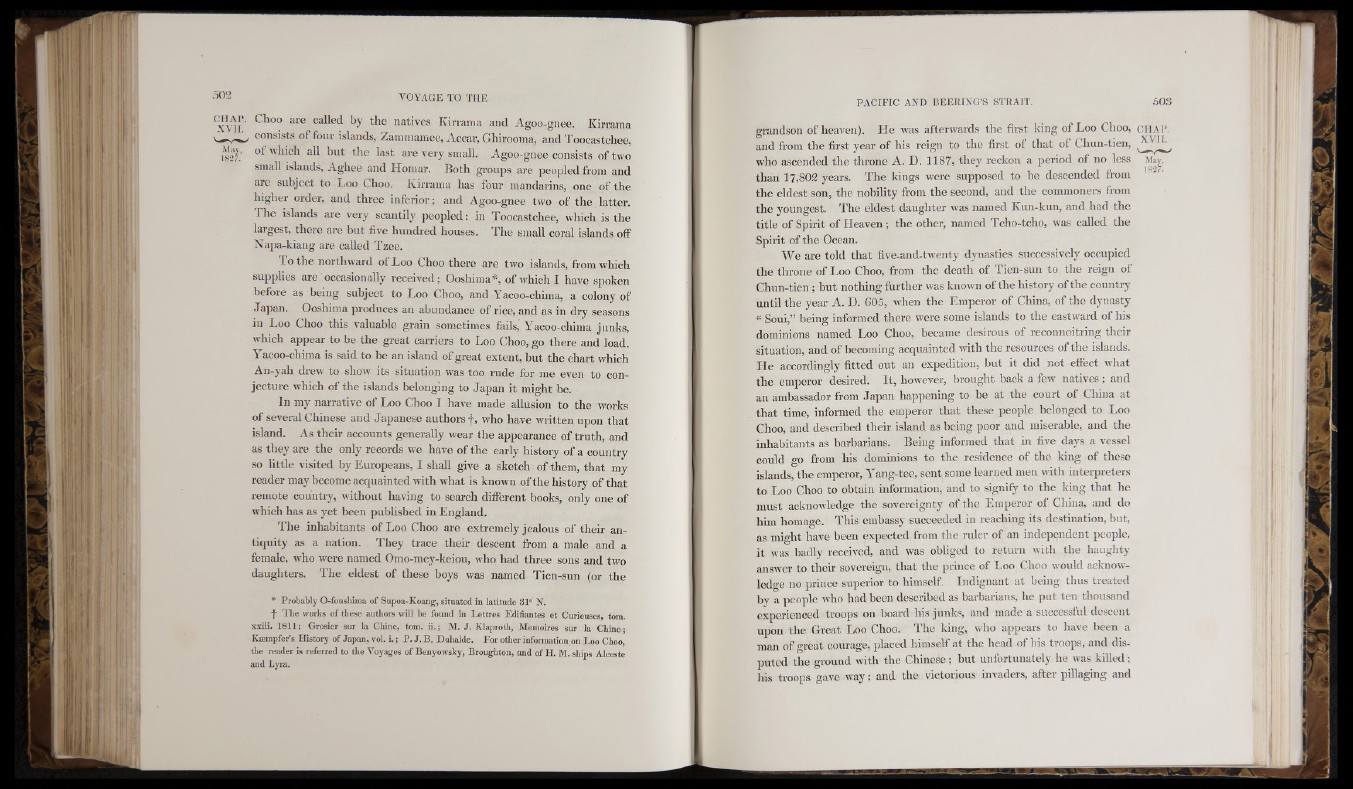
' , r '
Choo are called by the natives Kirrama and Agoo-gnee. Kirrama
, consists of four islands, Zammamee, Accar, Ghirooma, and Toocastchee,
of which all but the last are very small. Agoo-gnee consists of two
small islands, Aghee and Homar. Both groups arc peopled from and
are subject to Loo Choo. Kirrama has four mandarins, one of the
higher order, and three inferior; and Agoo-gnee two of the latter.
The islands are very scantily peopled : iu Toocastchee, which is the
largest, there are but five hundred houses. The small coral islands off
Napa-kiang are called Tzee.
1 o the nortliward of Loo Choo there are two islands, from which
supplies are occasionally received ; Ooshiina*, of which I have spoken
before as being subject to Loo Choo, and Yacoo-clnma, a colony of
.Japan. Ooshinia produces an abundance of rice, and as in dry seasons
in Loo Choo this valuable grain sometimes fails, Yacoo-chima junks,
which appear to be the great carriers to Loo Choo, go there and load.
Yacoo-chima is said to be an island of great extent, but the chart which
An-yah drew to show its situation was too rude for me even to conjecture
which of the islands belonging to Japan it might be.
In my narrative of Loo Choo I have made allusion to the works
of several Chinese and Japanese authors f, who have written upon that
island. As their accounts generally wear the appearance of truth, and
as they are the only records we have of the early history of a country
so little visited by Europeans, I shall give a sketch of them, that my
reader may become acquainted with what is known of the history of that
remote country, without having to search different books, only one of
which has as yet been published in England.
Tlie inhabitants of Loo Choo are extremely jealous of their antiquity
as a nation. They trace their descent from a male and a
female, who were named Omo-mey-keiou, who had three sons and two
daughters. The eldest of these boys was named Tien-sun (or the
* P robably 0 -fo u sh im a of S upoa-K oang, situa ted in latitu d e 31° N.
f T h e works of these authors will b e found in L e ttre s Edifiantes e t Curieuses, tom.
xx iii. 1811; Gro sie r su r la Chine, tom. ii. ; M . J . Klap ro th , Mémoires su r la C h in e ;
Kæmpfer’s Histo ry of Jap a n , vol. i. ; P . J . B . Dulialde. F o r other information on Loo Choo,
th e re ad e r is re ferred to th e Voyages of Benyowsky, Broughton, and of H . M. ships Alceste
an d Lyra.
grandson of heaven). He was afterwards the first king of Loo Choo, C H A P .
and from the first year of his reign to the first of that of Chun-tien, ^
who ascended the throne A. D. 1187, they reckon a period of no less
Mav,
than 17,802 years. The kings were supposed to be descended from
1827.
the eldest son, the nobility from the second, and the commoners from
the youngest. The eldest daughter was named Kun-kun, and had the
title of Spirit of Heaven ; the other, named Tcho-tcho, was called the
Spirit of the Ocean.
We are told that five-and-twenty dynasties successively occupied
the throne of Loo Choo, from the death of Tien-sun to the reign of
Chun-tien ; but nothing further was known of the history of the country
until the year A. D. 605, when the Emperor of China, of the dynasty
“ Soul,” being informed there were some islands to the eastward of his
dominions named Loo Choo, became desirous of reconnoitring their
situation, and of becoming acquainted with the resources of the islands.
He accordingly fitted out an expedition, but it did not effect what
the emperor desired. It, however, brought back a few natives; and
an ambassador from Japan happening to be at the court of China at
that time, informed the emperor that these people belonged to Loo
Choo, and described their island as being poor and miserable, and the
inhabitants as barbarians. Being informed that in five days a vessel
could go from his dominions to the residence of the king of these
islands, the emperor, Yang-tee, sent some learned men with interpreters
to Loo Choo to obtain information, and to signify to the king that he
must acknowledge the sovereignty of the Emperor of China, and do
him homage. This embassy succeeded in reaching its destination, but,
as might have been expected from the ruler of an independent people,
it was badly received, and was obliged to return with the haughty
answer to their sovereign, that the prince of Loo Choo would acknowledge
no prince superior to himself Indignant at being thus treated
by a people who had been described as barbarians, he put ten thousand
experienced troops on board his junks, and made a successful descent
upon the Great Loo Choo. The king, who appears to have been a
man of great courage, placed himself at the head of his troops, and disputed
the ground with the Chinese ; but unfortunately he was killed;
his troops gave way; and the victorious invaders, after pillaging and